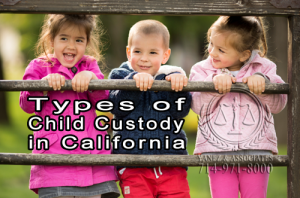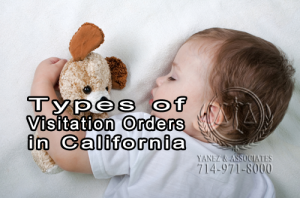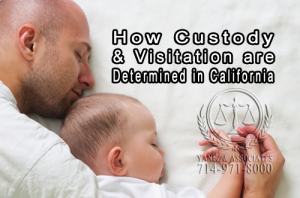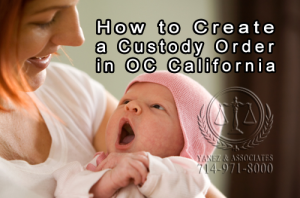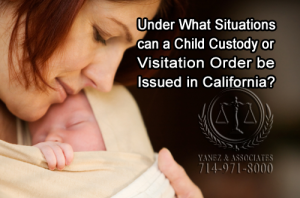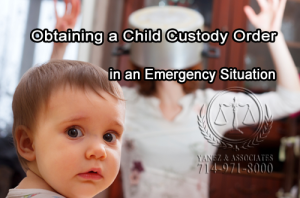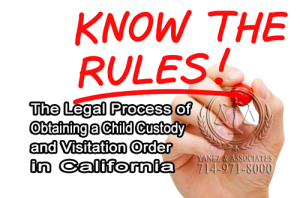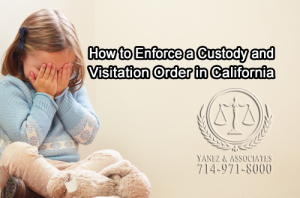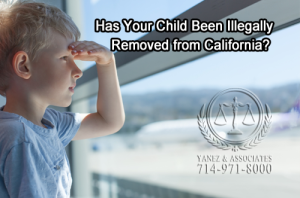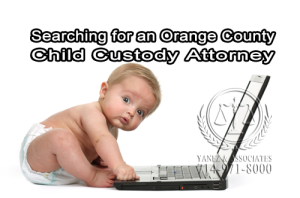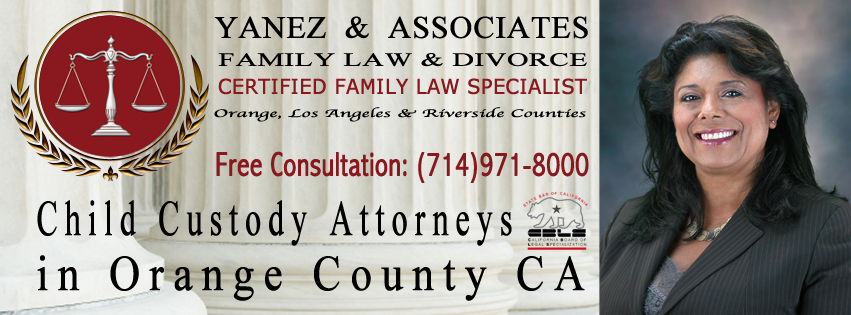Child Custody Attorneys in Orange County Guide
Child Custody in California
Child Custody Attorneys in Orange County: Child custody in California refers to the rights and responsibilities of parents when it comes to caring for their children. Custody can deal with where a child lives as well as who is responsible for making decisions for the child regarding his or her welfare. Visitation allows the other parent to spend time with the child, even if he or she does not have custody of the child.
California law allows both parents to share custody of a child, or for one parent to be awarded sole custody. Either way, the custody arrangement is made based on what is in the best interest of the child.
Custody can be determined by the parents, if they can agree on a parenting plan that is in the best interest of the child. If the parents cannot agree, a judge will set the terms of the custody and visitation order.
Types of Child Custody in California
There are two types of child custody regarding the child’s physical and mental wellbeing in California.
Legal Custody - Legal custody determines which parent is responsible for making decisions regarding the child’s well being, including decisions about health care, education, and extracurricular activities.
Physical Custody - Physical custody determines with whom the children will live.
Legal Custody
Legal custody can be either joint, or sole. A parent, or parents, who are awarded legal custody of their child have the right, and the responsibility of making decisions regarding many aspects of the child’s life.
• Legal custody allows a parent to make decisions regarding the child’s education, including schooling and child care;
• Legal custody allows a parent to make decisions regarding the child’s religion, religious activities and religious institutions;
• Legal custody allows a parent to make decisions regarding a child’s psychiatric, psychological, and other mental health, counseling or therapy needs;
• Legal custody allows a parent to make decisions regarding a child’s physical health
When a judge awards joint legal custody, it means that both parents share the rights and responsibilities of making decisions regarding their child’s health, education, religion, welfare, and more.
Just because the parents share joint legal custody does not mean that they have to agree on all decisions - either parent can make a decision for the child on his or her own. However, it is best if the parents can work together to avoid having problems that put them back in court.
When sole legal custody is awarded, only one parent has the right and the responsibility of making important decisions regarding the child’s health, education, religion, welfare, and more.
Physical Custody
Physical custody can also be either joint or sole.
When the judge awards joint custody, both parents share the responsibility of providing a home for the children. This does not mean that the child will spend exactly half of his or her time with each parent. In most cases, because it is more feasible, the child will spend slightly more time with one parent than with the other. The parent with whom the child spends slightly more time is also called the primary custodial parent.
When sole custody is awarded to one parent, that parent is called the custodial parent, and the other parent is the noncustodial parent. The child lives with the custodial parent. Usually the noncustodial parent also has visitation rights with the child, which means that even though the child does not live with both parents, he or she will still spend time with both parents.
In some cases, the judge will award joint legal custody but sole physical custody. This would mean that while both parents had the right to make decisions regarding the child’s health and welfare, the child would live with only one parent. The other parent will likely have visitation rights to spend time with the child.
Types of Visitation Orders in California
When sole custody is awarded to one parent, the custodial parent, the other parent is called the noncustodial parent. However, just because the child does not live with the noncustodial parent doesn’t mean that the child cannot spend time with that parent. A judge may award sole custody because the noncustodial parent lives too far away to make joint custody reasonable.
In any case, the it is usually in the child’s best interest to see both parents, so when sole custody is awarded to one parent, the other usually has the right to visitation.
Visitation orders can vary, and like custody orders, they depend on the best interests of the child, as well as the parents’ situations, as well as other factors. There are four main types of visitation orders that can be issued in California.
Scheduled Visitation Orders - Scheduled visitation orders are usually helpful when the parents are either very busy, very disorganized, or when they are on bad terms, have bad communication with each other, or just prefer a simple, direct order. These types of visitation orders include detailed terms, like the times, dates, and locations of the visitations. Things like holidays, special occasions, birthdays, and vacations can also be included in a visitation schedule.
Reasonable Visitation Orders - Reasonable visitation orders are less detailed than scheduled visitation orders, and do not include the dates, times and locations of the visitations. The open-endedness of these orders allows more flexibility for the parents to work out a schedule that works for them on their own. A reasonable visitation order can work if the parents get along, have good communication skills and can be flexible with one another. However, if there are disagreements or misunderstandings, a reasonable visitation order can cause problems within the family and they may have to go back to Court.
Supervised Visitation - Sometimes it is in the child’s best interest not to spend time alone with the noncustodial parent. If the child’s safety or well being are at risk, or if there is a risk of abduction, the Court may issue a child custody order that requires visits with the noncustodial parent to be supervised by the custodial parent, another adult, or a professional agency.
Supervised visitation may be awarded for several reasons, like the following:
• When the noncustodial parent is trying to prove that he or she is worthy of visitation or custody of the child;
• To allow the noncustodial parent and child to be reacquainted after the parent has been absent for a long period of time;
• To allow the noncustodial parent and child to get to know one another if they have never met before, or have had no existing relationship;
• When the noncustodial parent has a history of, or faces allegations of domestic violence, child abuse, neglect, or substance abuse;
• When the noncustodial parent may have a mental illness;
• When there is reason to believe that the noncustodial parent may abduct the child.
If supervised visitation is awarded, the court order will also detail the time, length, and possibly the location of the visits. Sometimes the order will also name the person who will supervise the visits.
No Visitation - When visitation with the noncustodial parent, supervised or unsupervised, would likely be physically, emotionally or mentally harmful to the child, no visitation would be awarded. This means that it is not in the best interest of the child to spend any time with the noncustodial parent.
How Custody and Visitation are Determined in California
California law requires that custody and visitation orders are made in the best interest of the child. To determine what is in the best interest of the child regarding custody and visitation, the court will take several factors into consideration.
• The age of the child;
• The child’s health;
• The emotional connection between the child and each parent;
• Each parent’s ability to care for the child;
• The family’s history of violence, abuse, neglect, or substance abuse;
• The child’s ties to his or her community, including school, home, or other activities.
Custody is not determined based on the sex or gender of either parent, or the sex or gender of the child, regardless of the child’s age. A parent’s right to custody or visitation cannot be denied because the parents were never married, or because of a disability or differing lifestyles, religions, or sexual orientations.
Even if a parent does not agree with the custody order, he or she is legally obligated to follow it. If the parent thinks that the terms of the custody order or the visitation order are not in the best interest of the child, the parent can apply to modify the child custody order.
Guardianship - If it is not in the best interest of the child to be in the custody of either parent, the court can grant custody to another person. This is called guardianship, and is usually temporary until the parent is fit to retain custody of the child.
How to Create a Custody Order in Southern California
Usually, parents can choose to create their own custody order in California, without a court order. However, only a legal court order can be legally enforced by the court. It is possible to turn an agreement between the parents into a court order, by submitting it to the judge, who can sign it into a court order that is legally enforceable.
If the parents cannot agree on the terms of a custody order on their own, they will have to start with child custody mediation. If the parents do not come to an agreement through mediation, they will have to go in front of a judge.
If the case goes to Court, the judge may appoint a child custody evaluator to create a custody and visitation plan, and/or a lawyer to represent the child.
Under What Situations can a Child Custody or Visitation Order be Issued in California?
The process of obtaining a child custody and visitation order in California varies depending on whether or not you have a family law case open or not, and under what situation you are trying to obtain a child custody order.
Married Parents
If the parents are married or in a registered domestic partnership, the following types of cases are appropriate times to ask for a custody and visitation order.
Divorce, Dissolution of Marriage, Legal Separation, or Annulment
After either parent has filed for a divorce, legal separation, or annulment, the parent can request a child custody or visitation order. A temporary custody or visitation order can be awarded during the process of the divorce or legal separation, and will expire when the divorce is finalized. If you wish, you can have a permanent custody and visitation order awarded as part of your divorce or separation.
Domestic Violence Restraining Order
If you or your children have been victims of domestic violence, you can request a child custody and visitation order when you request the domestic violence restraining order. When you file your paperwork regarding a temporary domestic violence restraining order, you can choose to include a temporary child custody and visitation order. If you wish to extend the child custody and visitation order, you can request to do so prior to your domestic violence restraining order hearing.
Petition for Custody and Support of Minor Children
If a parent does not want a divorce or legal separation, a Petition for Custody and Support of Minor Children case allows the court to create a child custody and visitation order while parents are still married.
Local Child Support Agency Case
Local child support agencies exist in California to ensure that every child receives the financial support that he or she deserves. If a child support creation, enforcement, or modification case has been filed on your behalf by the local child support agency, the parents can also request that the local child support agency files a case regarding child custody in certain circumstances.
Unmarried Parents
If the parents are not married or in a registered domestic partnership, the following cases are appropriate situations in which to request a custody or visitation order.
Parentage or Paternity Case
Parents who are not married but have a child together may open a case to determine who the parents of the child are if it is not known. In a parentage or paternity case, a parent can also request a child custody, visitation or even a child support order.
Domestic Violence Restraining Order
Victims of domestic violence, or parents who have children who are victims of domestic violence can request a domestic violence restraining order to protect themselves and their children from violence, abuse, or neglect. A temporary child custody and visitation order can be requested when a temporary domestic violence restraining order is requested, and a permanent order can be requested prior to the domestic violence restraining order.
Petition for Custody and Support of Minor Children
If the parentage has been determined through the voluntary signing of a Declaration of Paternity, either parent can file a Petition for Custody and Support of Minor Children. During this type of case, the court can also create orders regarding child custody and child visitation.
A Case with your Local Child Support Agency
If the local child support agency has already opened a child support case regarding a child, either parent can request that the local child support agency also include a child custody and visitation order under certain circumstances.
Obtaining a Child Custody Order in an Emergency Situation
Temporary child custody orders can be issued in certain cases, if a person can prove that there is a risk that the child will be harmed or abducted without an emergency custody order.
An emergency child custody order, also called an ex parte order, only lasts for a short period of time, until a hearing can be held to determine whether or not the order should be extended. It is important to act quickly, and to be extremely detailed when requesting an ex parte child custody order in California.
The Legal Process of Obtaining a Child Custody and Visitation Order in California
Once you have one of the above mentioned family law cases open in a California court, you can make a custody and visitation request. Usually, you will have to go through custody mediation before you can take your case to Court. Check with your attorney to see if this is the case for you.
To request a child custody and visitation order, you will first need to fill out a Request for Order. You can also fill out a Child Custody and Visitation Application Attachment to fill in the details of your request.
If you have created a proposed parenting plan on your own, with your attorney, or with the other parent either in mediation or on your own, you should attach that to the forms.
Always have your attorney review your forms, in any case, before submitting them to the court. Especially when it comes to your children, taking shortcuts is not in their best interest, and is not advised.
You should always have two copies of all forms: one for you, one for the other parent, and one for the court to keep on file. File all forms and copies with the court clerk, and pay the filing fee. You will get a court date from the court clerk, and then the papers that you filed and the notice of the court date will need to be served on the other parent.
A person who is not you or the other parent, but who is over 18 years old must serve the other parent. The Request for Order needs to be served within a specific time period, and your attorney can help make sure that this is taken care of. Depending on your case, the time period can vary. Once the other parent has been served, a Proof of Service will need to be filed with the Court.
In some cases, mediation will be required prior to the hearing date. If you do come to an agreement during mediation, the mediator can help you write up an agreement that the judge will sign into a court order. This becomes your child custody and visitation order. If you and your child’s other parent do not reach an agreement regarding the terms of the custody order during mediation, you will have to go to court. During the hearing, the judge will create the terms of the court order based on the best interest of the child, and the parents’ current situations.
Following a custody hearing, the judge will sign the court order, and you will have a child custody and visitation order that can be legally enforced or modified. Make sure to ask your attorney if the court clerk will have the judge sign the order, or if it is either your responsibility to have it signed, or your attorney's responsibility.
How to Modify a Custody and Visitation Order in California
As a child grows older, or as parents’ lives change, the terms of the current child custody and visitation order may no longer be in the best interest of the child. There are many reasons why a child custody order, or a visitation order may need to be changed, or modified. Usually, custody orders are modified about every two to three years.
If the parents agree on the changes that need to be made to the custody or visitation order, they can create an agreement, submit it to the judge, and have it signed into a new child custody order. However, if the parents cannot agree on the changes that need to be made, one parent needs to file a case with the court requesting a modification of the current child custody and visitation order. Usually, the first step in changing a custody and visitation order is going through child custody mediation.
In order to justify legally changing a child custody order, the parent requesting the change needs to show that there has been a change in circumstances since the existing child custody order was created. The change in circumstances means that the current custody order is not in the best interest of the child, so the modification is needed.
Child custody orders should always allow the child to have a stable and consistent custody arrangement with both parents, and a change or modification will only be made if it is in the best interest of the child.
Child Support Orders - Child support orders are made separately from child custody orders, but they are related. Child support orders can change when child custody orders change, because one of the factors that determine the amount of child support the order requires is the amount of time that either parent spends with the child.
However, disobeying a child custody order is not a reason to stop paying child support. Either order is enforceable regardless of the other order. If the other parent stops paying child support, that is not a reason to keep them from spending time with the child. A violation of either order can result in serious consequences for the parent who violates the order, including being held in contempt of a court order.
How to Enforce a Custody and Visitation Order in California
In order to enforce a child custody and visitation order, like any other court order, it must be proven that the order existed, and was a legally enforceable court order, signed by a judge, and that both parties were aware of the existence of the custody and visitation order.
Once these two requirements have been met, the custody and visitation orders are legally enforceable under California law. In order to make it easy to enforce these orders, it is important that you do the following:
• Always carry a copy of your current child custody and visitation order in a safe place. All people who are involved in the custody or visitation should also have a copy of the order. This includes the child’s other parent, any supervisors who are a part of supervised visitation, and any people who help with the exchange of the child from one parent to the other.
• If necessary, make sure that your order is as detailed as possible. In some cases, a scheduled visitation order is the best way to go, because there can be little question as to how it should be interpreted.
• Every time that you and the child’s other parent make changes to the custody or visitation plan for your child, make sure that you modify the custody order. Keeping an updated copy of the order will make it easier to enforce. The custody and visitation order should detail how much time the child should spend with each parent, where the parents live, where the child will attend school, get medical care, attend religious activities, who is responsible for picking up and dropping the children off, and other needs of the child, depending on your family situation.
If one of the parents does not follow the terms of the custody order, these actions will make it much simpler to enforce. When the other parent is not following the terms of the order, take one of the following actions.
• Contact your local law enforcement office and ask them to enforce the order;
• Contact your county’s district attorney, and get in touch with the Child Abduction Recovery Unit;
• File an action with the court for “contempt of a court order.” In this case, you should talk to an attorney, because you are opening a contempt case in which the court can find the other parent guilty of willfully disobeying the custody and visitation order. The other parent can face serious consequences, and the case can be complex and may affect the children. It is always best to have accurate and detailed records of all custody and visitation violations so that you can prove that the other parent violated the order.
If you do decide to take the case to court as a contempt of a court order case, be sure to contact an attorney in Orange County who has experience working with family law and contempt of a court order cases.
Unfortunately, custody and visitation orders are one of the most often violated, and least often enforced orders, at least when it comes to contempt of court proceedings. It is always best to try to work out the issue with the other parent, rather than to charge them with contempt of court order, but if working it out isn’t possible, contempt may be the best option.
Kidnapping
The easiest way to deal with child abduction is to prevent it. If you are worried that there is a reasonable risk that the other parent might kidnap your child, follow the following precautions as listed by the U.S. Department of State.
• Maintain a list of the contact information, including addresses and telephone numbers, of the child’s other parent’s relatives, friends, business associates, etc. both in California, across the United States, and abroad;
• Maintain a record of important information about the other parent. This includes a physical description or photography, their passport information, social security information, bank account information, and drivers’ license number, a description of their vehicle, and their license plate number;
• Keep a written description of your child, or a current photograph. Also keep a record of your child’s hair color, eye color, height, weight, fingerprints, and any other special physical characteristics;
• Keep photographs that have been taken within the last six months. All of this information could be helpful in finding and identifying your child and his or her other parent should the child be abducted.
It is also smart to teach your children your phone number, how to make collect calls, and how to use the phone. They should know to call you as soon as possible if anything out of the ordinary happens. Child custody and visitation schedules are usually made so that the child has some stability and regularity, so most children who are at least five years old should notice if something out of the ordinary has occurred even if they know and trust the other parent.
If you have serious fears about child abduction, discuss your fears with an attorney as soon as possible.
Has Your Child Been Illegally Removed from California?
If your child has been kidnapped, contact the police immediately. Even if you have a child custody order from California, the governments of other states and other countries will work with you and local law enforcement to determine how to protect your child.
Assuming your child is U.S. citizen, the State Department’s Office of Children’s Issues will work with the United States embassies and consulates around the world to help you and your child. Unfortunately, child custody is a private matter between the parents, so the State Department has little power if the other parent is not willing to cooperate.
If your child custody order is specific about the parents’ rights regarding traveling with the child, it may help your case. However, if your child has been kidnapped and is abroad, the custody agreement may not be recognized by foreign governments, and may not be enforceable abroad.
The Hague Convention, an international treaty that has been signed by many countries, was created in regards to international adoptions and international child abductions. All countries that have signed the convention have agreed that if a child is a citizen of one of the countries that has signed the convention, and that child is removed from that country to another country that has also signed the convention in violation of a custody and visitation order, the child must be returned to the original country of residence as soon as possible in order to sort out the custody and visitation issues. The countries that signed the convention are listed here.
Albania, Andorra, Armenia, Australia, Austria, Azerbaijan, Belarus, Belgium, Belize, Bolivia, Brazil, Bulgaria, Burkina Faso, Burundi, Cambodia, Canada, Cape Verde, Chile, China and Hong Kong, Colombia, Costa Rica, Cuba, Cyprus, Czech Republic, Denmark, Dominican Republic, Ecuador, El Salvador, Estonia, Fiji, Finland, France, Georgia, Germany, Greece, Guatemala, Guinea, Hungary, Iceland, India, Ireland, Israel, Italy, Kazakhstan, Kenya, Latvia, Lesotho, Liechtenstein, Lithuania, Luxembourg, Macedonia, Madagascar, Mali, Malta, Mauritius, Mexico, Moldova, Monaco, Mongolia, Montenegro, Netherlands, New Zealand, Norway, Panama, Paraguay, Peru, Philippines, Poland, Portugal, Romania, Rwanda, San Marino, Senegal, Seychelles, Slovakia, Slovenia, South Africa, Spain, Sri Lanka, Swaziland, Sweden, Switzerland, Thailand, Togo, Turkey, United Kingdom, Uruguay, Venezuela, and Vietnam
If your child has been abducted and taken to another country, it is in your best interest to contact an attorney as soon as possible. The terms of the Hague Convention are complex, and a skilled lawyer is your best resource.
Need an Orange County Child Custody Attorney?
If you have questions about child custody, whether you need to obtain a child custody order, modify an existing order, enforce a child custody or visitation order, or if you are worried about abduction or international kidnapping, contact an attorney as soon as possible. When your children are involved, it is never a good idea to take shortcuts. The attorneys at Yanez & Associates are here to help ensure that your child’s best interests are protected. Contact us today to schedule your free initial consultation.


